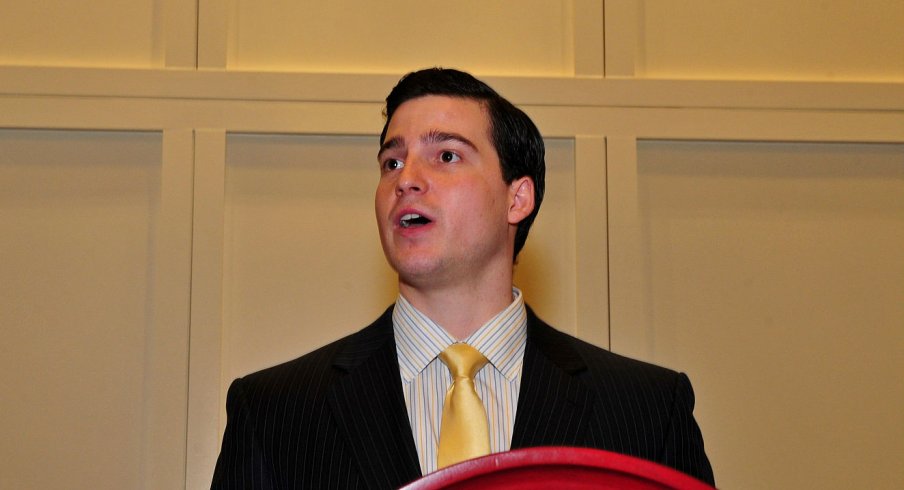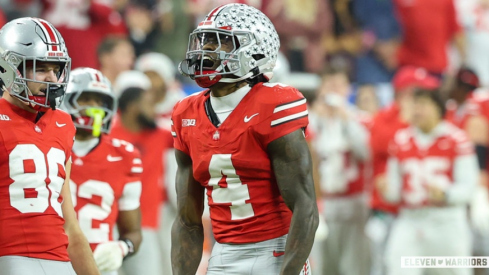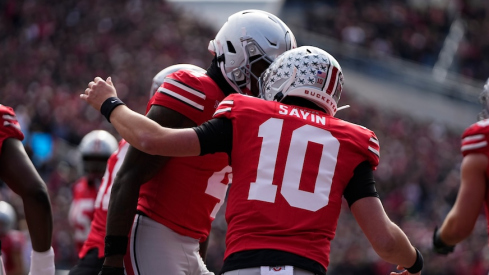In college athletics, there are three types of injuries. There are the dings and bruises that everyone deals with; there are the sprains and tears that delay an athlete's career; and then there are debilitating injuries, ones that end careers and impact lives after college.
With one notable exception1, Ohio State has been fortunate to not have any of its athletes suffer debilitating injuries. Instead, the Buckeyes saw the worst happen to an opponent.
On Sept. 30, 2000, Adam Taliaferro suffered a severe neck injury against Ohio State that crushed vertebrae and paralyzed him from the neck down. With the support of the Penn State community, Taliaferro recovered feeling and has been important person in the Penn State community. Today, he holds a spot on Penn State's Board of Trustees.
Taliaferro is a rare success story. Most athletes who suffer debilitating injuries never recover, and many have to bankrupt themselves to pay bills and medical costs. Because of the limits on colleges taking care of these people, some former players have sued the NCAA on the grounds of not protecting players better.
While that ugliness goes through the court system, one non-profit has started to pay for neglected athletes' care – and it's run by a Buckeye.
Ryan Brant began his lacrosse career as a Buckeye, playing at Ohio State in 2010 and 2011. After injuries cut into playing time, he transferred to Hofstra, where he suffered a career-ending injury. After graduating from Hofstra, Brant started a non-profit called Positive-Strides in December 2013 to help those sufferers. His organization has a unique function: provide support to those athletes that the NCAA and their schools won't.
Recently, I had the opportunity to interview Ryan Brant and learn more about him and his organization.
What is Positive-Strides?
Ryan Brant: Positive-Strides.Org provides guidance and assistance to athletes who have suffered a catastrophic, life-altering and/or career-ending sports-related injuries with mental, physical and financial support. It is a 501(c)3 non-profit public charity (application pending.)
When did you found Positive-Strides? What led you to start your charitable organization so soon after graduating from Hofstra?
Ryan Brant: I founded Positive-Strides.org to help prevent athletes going through what I went through after suffering a career ending injury-- four knee surgeries from lacrosse injuries on my right knee and most recently back surgery last July. I founded Positive-Strides.org in December of 2013 while the pain and frustration was still fresh in my mind. I have been through it all and I don’t want anyone else to go through it.
When I transferred to Hofstra University in 2011, I began research to see if any organizations, foundations, etc. provided help to athletes who have suffered sports-related injuries. I found numerous foundations that provide services for athletes, but the majority of them only provide research. Research is all well and good –eventually it will pay off – but how does research help athletes now?
Ryan Brant spent two years at Ohio State as a backup goalie. Though he played well, injuries limited his playing time and he transferred to Hofstra. At Hofstra, Ryan suffered career-ending knee and back injuries. One of the noticeable differences between the schools: how the students support the lacrosse program.
How did your own history of surgeries affect your decision to found Positive-Strides?
Ryan Brant: My own injuries had a significant impact on my decision. I went through a lot, with surgeries, depression, picking up bad habits, etc. If it had not been for my family and friends I do not know where I would be today. I want athletes in similar situations to be able to reach out to us, so that we can help them and provide guidance and assistance.
It's pretty clear that you enjoyed and still enjoy lacrosse. What led you to play at Ohio State?
Ryan Brant: The Ohio State University grabbed my attention because of its great athletic history, Fisher College of Business and Coach Breschi. I wanted to be part of a program that was on the rise and to be a key contributor, so OSU was the place to be. Unfortunately, Coach Breschi later decided to leave OSU.
What differences did you see in the treatment of players at Ohio State and Hofstra?
Ryan Brant: At Hofstra University, lacrosse is the main sport on campus since it discontinued football in 2009. The student body embraced the lacrosse team and was very supportive. We drew all the attention on campus, good and bad. OSU is a football school, obviously, so lacrosse is somewhat a secondary sport.
You were at Ohio State in 2010 and 2011, so you saw the entirety of the football team's scandal. How much did that affect your team, and did it affect your opinion of college athletics?
Ryan Brant: Being a student-athlete at OSU during that time was a bit stressful, because every single athletic team was put under a microscope. I would not say it affected my team’s play, but it did affect how we carried ourselves in the public eye. We made sure to dot our I’s and cross our T’s.
Do you think your lacrosse background gives you a perspective that someone in a revenue-generating sport (like football, basketball or baseball) might lack?
Ryan Brant: I come from a family of athletes (I have cousins who have played Division I football at University of Maryland and UCLA). I played football, basketball and all other sports growing up. Lacrosse was just a sport that I fell in love with at an early age. So, I know what really goes on in a lot of sports.
I am very fortunate that my family was able to provide the very best in medical care once I left OSU, but not all athletes are as fortunate. Policies vary from school to school. Sometimes the results of injuries don’t present themselves right away, and in those cases it is possible that the college or university will not cover the cost of surgery or rehabilitation. I started Positive-Strides to provide those athletes with resources for healing mentally, physically and financially.
After the foundation of Positive-Strides, Ryan was looking for a former athlete in need of assistance: Stanley Doughty, a former South Carolina player with a severe spinal injury. Helping Doughty marked the beginning of Positive-Strides as a practical, charitable entity.
Jon Solomon of CBS Sports recently wrote about Positive-Strides. He focuses on Stanley Doughty, a former South Carolina with a severe spinal injury which your organization has helped. How did you find out about Doughty's condition, and what has Positive-Strides done to help him?
Ryan Brant: I was doing research, looking for injured athletes, and came across an article that was written about Stanley Doughty in October. I spent almost three months trying to track Stanley down with no luck. About two months ago, I received a phone call from one of his lawyers who helped us connect. Since connecting, Positive-Strides.org has provided transportation from Stanley’s home in Amite, Louisiana to Lacombe, Louisiana to get a new MRI and see Dr. Donald Dietze (Neurosurgeon) at The North Institute. We are currently raising funds to cover Stanley’s medical expenses so we can provide him with the Laminoplasty surgery that is badly needed.
Once you sign a NLI, neither the NCAA nor your school is liable for treatment of any injuries on or off the field.
Once Stanley has healed from surgery, we plan on helping him go back to school to graduate and earn his degree, which will be followed by assisting him to find a job and get back on his feet. We want to help as many athletes as possible, as there are thousands of Stanley Doughtys out there.
What kinds of financial hardships do athletes that suffer catastrophic injuries go through?
Ryan Brant: All athletes are prone to suffering injuries throughout their career. Some may be minor, while others may take away our ability to play the sports we love. Many athletes may not be able to afford medical insurance and even though the majority of athletes do have private insurance, their insurance generally does not cover all medical costs. In Stanley’s case, he was left to pay 100% of his medical costs.
When you sign a National Letter of Intent, you think everything is taken care of and provided to you. Little did I know, even while I was a student athlete at OSU and Hofstra, that both universities are not legally liable for any medical expenses I incurred while representing the University. Once you sign a NLI, neither the NCAA nor your school is liable for treatment of any injuries on or off the field. Although the majority of schools provide medical care to their athletes, they are not required to.
That is the case for Stanley Doughty. No student athlete should have to be financially responsible for medical expenses while representing his/her university in competition. This is why the Northwestern football team is leading the charge for unionization. They are fighting for guaranteed medical coverage, especially for those who suffer serious injuries while playing and who will continue to need medical treatment for some time after collegiate athletics are over. The lack of support is well documented, but nobody seems to want to get involved, which gave Positive-Strides an opportunity to provide services to thousands of athletes who are left to fend for themselves.
Did anyone from your lacrosse teams affect your view of injured players? Coaches, teammates, training staff?
Ryan Brant: I have played on many teams throughout my lacrosse career. There are coaches, teammates and training staff that will help you and guide you through your injury and then there are some that leave you behind and cast you aside. It is sad to say, but I have experienced both sides of the spectrum, which gave me inspiration and passion to found Positive-Strides.org.
In the end, we may be growing up and becoming young adults, but that does not mean we do not need help, assistance, and guidance with how to handle situations-- especially when dealing with an injury. In my case, I suffered two knee surgeries within three months and suffered depression related to my condition.
How big is your organization, and how many players has your organization reached out to?
Ryan Brant: Since we are a fairly new organization, a little over five months old, we are pretty small. We are currently helping 15 athletes, both men and women. We plan to help out many more athletes as we continue to grow. As word spreads among the athletic community, we have been receiving calls from all around the country from athletes suffering from injury related effects and asking for help.
We want to provide resources for injured athletes to heal their bodies and their souls.
What kind of help does Positive-Strides provide for those 15 athletes?
Ryan Brant: Positive-Strides.org provides a number of services to our athletes. We expedite the process of scheduling appointments with doctors, surgeons and psychologists. We provide financial support for medical services and surgeries. We provide athletes with mentorship programs that focus on life after athletics. Additionally, we plan to host educational symposiums and seminars for injury prevention. Lastly, Positive-Strides plans to offer scholarship assistance to those injured athletes who have lost their scholarships due to their injuries.
Besides Positive-Strides' financial support, there's a clear inspirational/motivational aspect to what you do. Is that part of your core philosophy?
Ryan Brant: Yes, we want to let injured athletes know they are not alone and not forgotten. We want them to know there is an organization that cares. We want to provide resources for injured athletes to heal their bodies and their souls.
When writing about Positive-Strides' advocacy CBS Sports' Jon Solomon was curious about Brant's relationship with the NCAA. Solomon asked "Is Positive-Strides.org angling for a role with medical monitoring after the NCAA potentially settles its concussion lawsuits?" That's cynical, but it raises the valid question of what Brant hopes to achieve.
If you were in charge of the NCAA's student athlete welfare policy, what changes would you make?
Ryan Brant: First, I would require guaranteed scholarships for four years, eliminating the coaches’ ability to take away an athletic scholarship due to medical injuries, poor performance, etc. Second, I would provide medical coverage for athletes who have finished playing their respective parts and who suffered a major injury during their career for at least an additional two years so they can continue to receive medical treatment.
You have said that you "didn't want to burn any bridges" with the NCAA over ongoing concussion lawsuits. How involved do you see your company being with the NCAA in the future?
Ryan Brant: We have reached out the NCAA Sports Science Institute to ask for its support. Our ultimate goal is giving back to the athletic community and to begin building awareness and helping injured athletes of all ages – youth, high school and college; both men and women – with medical and financial services. We certainly hope that the NCAA will see us as a friend, not a foe.
Do Positive-Strides' aims require a "war chest"? What are your funding goals?
Ryan Brant: Our aspirations are ambitious became the problem is urgent. Sports related injuries are a growing epidemic and are just now starting to get the attention they deserve. We are looking to raise $1 million in our first year and $4.5 million more by 2020.
11W: How can people contact or contribute to Positive-Strides?
Ryan Brant: Interested people can visit our website at www.positive-strides.org, or follow us on Facebook and Twitter. We have a donation link on our website for anyone who would like to contribute to the foundation. These funds will be directed toward providing services to our current and future athletes.
- 1 Tyson Gentry, a walk-on receiver and punter, was paralyzed in a football practice collision in 2006. ↑


